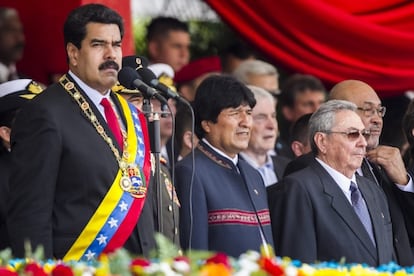Venezuela breaks relations with Panama for calling OAS meeting
Maduro warns regional group he will take action if there is foreign intervention

Venezuela broke relations late Wednesday with Panama for calling an emergency meeting of the Organization of American States (OAS) to discuss the political and social unrest that has disrupted the lives of Venezuelans for the past four weeks.
During a ceremony to observe the first anniversary of the death of Hugo Chávez, President Nicolás Maduro warned the OAS to stay out of Venezuelan affairs and called the conservative administration of Panamanian President Ricardo Martinelli “a flunky government.”
Panama reacted by saying that it wasn’t going to accept “rude language” and denied that it was trying to get involved in Venezuelan internal affairs. Panamanian Foreign Minister Francisco Álvarez cancelled his scheduled Thursday visit to Spain to deal with the diplomatic crisis.
“The OEA needs to stay put,” Maduro said during a speech after a military parade in Caracas dedicated to Chávez’s memory that was attended by the presidents of Cuba, Bolivia, Nicaragua and Suriname.
“The 60 years of coups by the disastrous OAS is past history. This is a rightwing government [Panama] that is trying to empanel the Permanent Council of the OAS; it is a plan of foreign intervention in the country and I am going to respond strongly and firmly to any type of attempt at intervention in Venezuela,” Maduro said.
The OAS was scheduled to meet later Thursday to discuss the Panamanian petition to call a high-level meeting of the region’s foreign ministers to discuss the unrest and allegations of repression of students and the opposition by the Maduro government.
I am going to respond strongly and firmly to any type of attempt at intervention in Venezuela”
In his Twitter account, Martinelli said he was “surprised” by the Caracas decision to break relations, and that Panama was “only looking to establish peace and strength for its brother country.”
Meanwhile, the unrest claimed another life on Wednesday. Héctor Alzaul Planchar, a former deputy and current leader of the opposition Progressive Forefront (AP) party was killed after he was shot in the chest as he left his organization’s headquarters in Barquisimeto, Lara state, by unknown gunmen, El Universal reported. According to police, the gunmen were waiting for him as he left the building.
The protests continued with students setting up street barricades throughout the country despite a call from the umbrella opposition platform, Unified Democratic Committee (MUD), to suspend demonstrations for one day to “respect the feelings of a sector of the country” observing the death of Chávez.
Chávez, who governed the country for nearly 15 years, died on March 5, 2013, after a long bout with cancer.
Makeshift road blocks and burning barricades were placed on major thoroughfares across the capital in an attempt to prevent the regional leaders – but especially Raúl Castro, whom the opposition accuses of being the person behind the throne in Venezuela – from gaining access to the ceremony site. Maduro said “fascist groups” were behind the road sabotages.
Castro was able to make it to the ceremony without any interruptions, as did Bolivia’s Evo Morales, Nicaragua’s Daniel Ortega – who hadn’t been seen in public for the past few days – and Suriname’s Dési Bouterse.
During the military parade, Venezuela’s armed forces showed off the latest equipment it had purchased from Russia, including ground-to-air missiles, Sukhoi aircraft, and T72 Soviet-style tanks. Militia groups, organized under Chávez in different neighborhoods across the country, also marched in the parade.
At 4.25pm, the official time when Chávez was said to have died, an observance was held at his tomb in the Historic Military Museum in Caracas. The day ended with the premiere screening of Oliver Stone’s latest documentary on Chávez, My Friend Hugo, which was broadcast on Telesur, the regional news network set up by the late Venezuelan president to counter CNN.
Tu suscripción se está usando en otro dispositivo
¿Quieres añadir otro usuario a tu suscripción?
Si continúas leyendo en este dispositivo, no se podrá leer en el otro.
FlechaTu suscripción se está usando en otro dispositivo y solo puedes acceder a EL PAÍS desde un dispositivo a la vez.
Si quieres compartir tu cuenta, cambia tu suscripción a la modalidad Premium, así podrás añadir otro usuario. Cada uno accederá con su propia cuenta de email, lo que os permitirá personalizar vuestra experiencia en EL PAÍS.
En el caso de no saber quién está usando tu cuenta, te recomendamos cambiar tu contraseña aquí.
Si decides continuar compartiendo tu cuenta, este mensaje se mostrará en tu dispositivo y en el de la otra persona que está usando tu cuenta de forma indefinida, afectando a tu experiencia de lectura. Puedes consultar aquí los términos y condiciones de la suscripción digital.








































